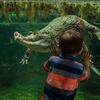In a landmark event for nature conservation, the National Trust has legally released the first two pairs of Eurasian beavers to live in the wild in Purbeck, Dorset. These beavers recently left their facility at Five Sisters Zoo.
This historic moment follows a groundbreaking policy announcement by Defra and Natural England last Friday (28 February), paving the way for wild beaver releases.
For the first time since the 16th Century, these extraordinary creatures will be able to legally roam freely across Purbeck, an area peppered with lakes and water courses.
Hunted to extinction on mainland Britain for their fur, meat, and scent glands, beavers are now set to play a crucial role in ecosystem restoration.
Beavers are nature’s engineers, creating wetland habitats that support countless other species. Their instinctive dam-building helps tackle the impacts of climate change by creating wetlands that retain water during floods and droughts, benefiting both nature and people. These natural dams also filter water, improving its quality downstream.
Since 2019, Five Sisters Zoo has worked closely with the Beaver Trust to facilitate the movement of beavers from conflict zones in Scotland to official enclosed projects in England, Wales and wild release sites in Scotland.
The project has supported over 200 beavers, using expert veterinary and quarantine facilities to provide health screenings and comfortable accommodation for the charismatic rodents. Beavers are incredible ecosystem engineers and the recent reintroduction of this keystone species has been a high-profile conservation success.
Gen Crisford, Beaver Project Officer at Purbeck at the National Trust, shared her delight: “As a true believer in beavers, today is incredibly exciting, a real watershed moment in the history of the species in England.
“We have worked closely with Natural England for the past seven years to develop an approach for a licensed release of beavers into the Purbeck landscape.
“Our chosen site at Little Sea is highly suitable for these special creatures due to it being an expansive body of fresh water surrounded by dense willow woodland which will provide the beavers with plenty of food."
Gen continued: “Beavers can sometimes cause conflict when they colonise areas where they aren’t wanted, but by working with all the local landowners in advance to plan for their arrival and put measures in place where needed, we are confident that in Purbeck we will be able to demonstrate how beavers can work for everyone.
“Thanks to our previous licensed, fenced reintroductions of beavers at other National Trust sites, we have learnt a lot and have seen first-hand the benefits these clever mammals can bring, and how they can contribute massively to targets for nature recovery.”
Nature Minister Mary Creagh said: "I am thrilled that, after being hunted to extinction centuries ago, wild beavers are finally here to stay. Today is an important milestone for national nature recovery.
“Beavers are ecosystem engineers who bring multiple benefits for people, for wildlife and for landscapes. They are a keystone species and create thriving wetlands for wildlife, reduce flood risk and improve the water quality of our rivers."
Related Members
-
News
 Amid rising costs, zoos are more relevant than ever… 3rd February, 2026It will come as no surprise to anyone working in the zoo sector that Britain and Ireland’s beloved zoos are facing challenges amidst a…
Amid rising costs, zoos are more relevant than ever… 3rd February, 2026It will come as no surprise to anyone working in the zoo sector that Britain and Ireland’s beloved zoos are facing challenges amidst a… -
News
.png?w=100&h=100&zc=1&f=jpeg&hash=aed4c6409e0441a61f3e1146ef560d83) Blog: Supporting Otter Conservation at Colchester Zoological Society 30th January, 2026Rebecca Moore (Zoological Director, Colchester Zoological Society) describes the charity's role in taking a global approach on the conservation…
Blog: Supporting Otter Conservation at Colchester Zoological Society 30th January, 2026Rebecca Moore (Zoological Director, Colchester Zoological Society) describes the charity's role in taking a global approach on the conservation… -
News
.png?w=100&h=100&zc=1&f=jpeg&hash=d2375a1baa7e4f03a56c766485cce667) Keepers Witness Birth of First Baby of 2026 at Safari Park 30th January, 2026A rare behind-the-scenes moment unfolded at West Midlands Safari Park as a giraffe gave birth to the Park’s first baby of 2026, with keepers there…
Keepers Witness Birth of First Baby of 2026 at Safari Park 30th January, 2026A rare behind-the-scenes moment unfolded at West Midlands Safari Park as a giraffe gave birth to the Park’s first baby of 2026, with keepers there…



